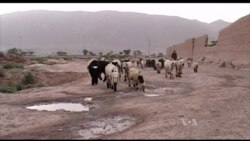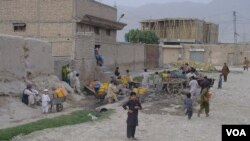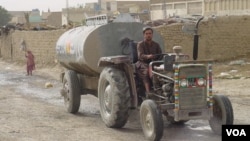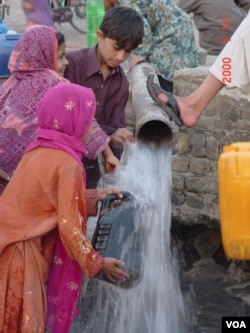Pakistan’s impoverished southwestern province of Baluchistan is again in the grip of an acute water shortage. This is a recurring problem, but despite years of warnings, critics say the government is doing little.
The province, which borders Afghanistan and Iran, is rich in natural gas and mineral resources, but water has long been scarce. With little rainfall, underground aquifers are the main source for drinking, agriculture and livestock.
Tens of thousands of legal and illegal tube wells have been draining those reserves. The number of officially authorized tube wells is around 30,000. But there are at least another 30,000 illegal wells.
The situation has reached a point where experts say the provincial capital Quetta will run out of water in the next few years without substantial conservation programs that help replenish the groundwater.
Geological expert Abdul Razaq Khilji said that until a few years ago in the city of more than three million people, water could be found at about 90 meters deep.
Now, water is beyond 365 meters, he says. The expense of digging such deep wells is beyond the reach of most families in the poverty-stricken region.
“We are in the mining stage of digging wells and we are using the last aquifer system of the Quetta aquifer system. The central city has run out of underground water,” said Khilji.
Farmers already reeling
Baluchistan’s orchards are already in crisis, with production falling by more than 70 percent, says Abdur Rehman Bazai, Secretary General of the Baluchistan Farms Growers Association
“The scarcity of water forced me to uproot around 7,500 fruit trees from my once profitable orchard and it has now turned it into a piece of barren land,” he added.
It has also deprived around 400 families associated with the orchards of their livelihood, and they all have migrated to other areas, Bazai said.
As tube wells dry up across the province, people are leaving. Farmers say many are abandoning agricultural businesses and are struggling to feed their families.
But not everyone is losing out on the water shortage. Those who can afford to dig deep, illegal wells are selling water at a profit. Many of those water profiteers are believed to be influential businessmen, politicians and lawmakers linked to the current provincial government who are able to avoid prosecution.
For many people, like Asia Mangi’s family, just buying enough water to live is already straining finances.
“Water is a basic necessity and you know survival without it is simply not possible. We are spending up to $150 (15,000) rupees a month to just buy water,” she said. “It is eating up a major portion of our income and if there is no relief you can well imagine how would we meet our other basic needs.”
Government offers little hope
Baluchistan’s provincial information and law minister Abdul Rahim Ziaratwal acknowledges successive governments have never built any water conservation projects in arid Baluchistan, even though there have been funds allocated for them in the past. But critics say the current government also has taken no practical steps to address the issue.
Leaders are now scrambling to show they are making progress, but few believe they will make much of a difference.
The Growers Association’s Bazai said past governments that allowed illegal wells to multiply have already done the damage and time is running out to fix the situation.
“We have sucked almost all of the water from top layers of the soil and now digging so deep to access underground water that it would not be wrong to say we are drinking water of our future generations,” said Bazai.
Officials and independent experts believe floodwaters that follow annual rains can help replenish underground water tables provided dams are built and recharging facilities are created in mountains around Quetta.
In its global report released last month, the International Monetary Fund (IMF) presented alarming statistics about Pakistan’s water scarcity problems.
Despite an abundance of water a few decades ago, lagging policies have raised the prospect of water scarcity that could threaten all aspects of the economy, says the IMF study.
The IMF has already declared Pakistan the third most water-stressed country in the world, where per capita annual water availability is at 1,020 cubic meters, just above to the scarcity threshold of 1,000 cubic meters.








